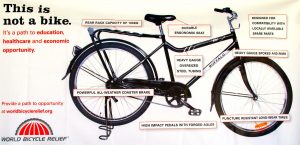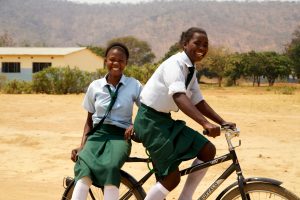The founder of World Bicycle Relief, F.K. Day, has recently given a really inspirational TED talk about how he started the charity. Day has spent most of his life designing high-performance bicycle components, he’s Executive Vice President of SRAM Corporation, so he knows a thing or two about bicycles! He tells of how in many places walking is still peoples main form of transport, and what they can do in a day is limited by when the sun goes down. He’s inspired by the way that bikes can give opportunity to poor people in such situations.
His story began in the aftermath of the Indian Ocean tsunami, in 2004. He was thinking of ways he could respond in a meaningful way, using the knowledge he had. Day realized he could help to get people moving again with bikes, but when he approached the offices of relief organizations in the USA they weren’t interested. So he flew out to Srilanka with his family and started talking to the relief agencies operating on the ground. These people loved the idea and he created a project which locally sourced and delivered 24,000 bikes. They also commisioned an independent assessment of the impact of this work which showed an improvement in healthcare, education and economic development.
As the project in the Indian Ocean was coming to an end Day was asked by one of the relief agencies if they would scale up their program for rural Africa. They decided to give it a try, focused on the three key areas of healthcare, education and economic development and intended to monitor their impact and publish the results. Initially, they worked with an organization which had trained 23,000 healthcare workers in Zambia. These workers were wasting too much time walking between villages and many of them were giving up as a result. Initially, Day tested locally produced bikes but they all failed almost immediately. When he approached them the suppliers all thought their bikes were fine, all except one. One supplier asked for help to improve their bikes so Day worked closely with them to develop bikes suitable for the harsh conditions.

This work, focused on health care providers, has now delivered 160,000 bikes in 18 countries. The next focus was on education. Girls in traditional African culture are responsible for household chores. The drop out rates for girls in Zambia are therefore much higher hand for boys. They, therefore, focused on giving bikes to girls. If they stayed in school they earned the bike in 2 years. 150,000 bikes have now been donated into education.

Wherever they were active. donating bicycles to support healthcare and education, they would get local entrepreneurs, often farmers, approaching them asking to buy bikes. They, therefore, founded a for-profit company, to sell bikes to these people. In this way, they are also supporting economic development in the communities where they work.
Finally, Day asks us to imagine the possibility when people are released from the bondage of distance.
Let us know what you think